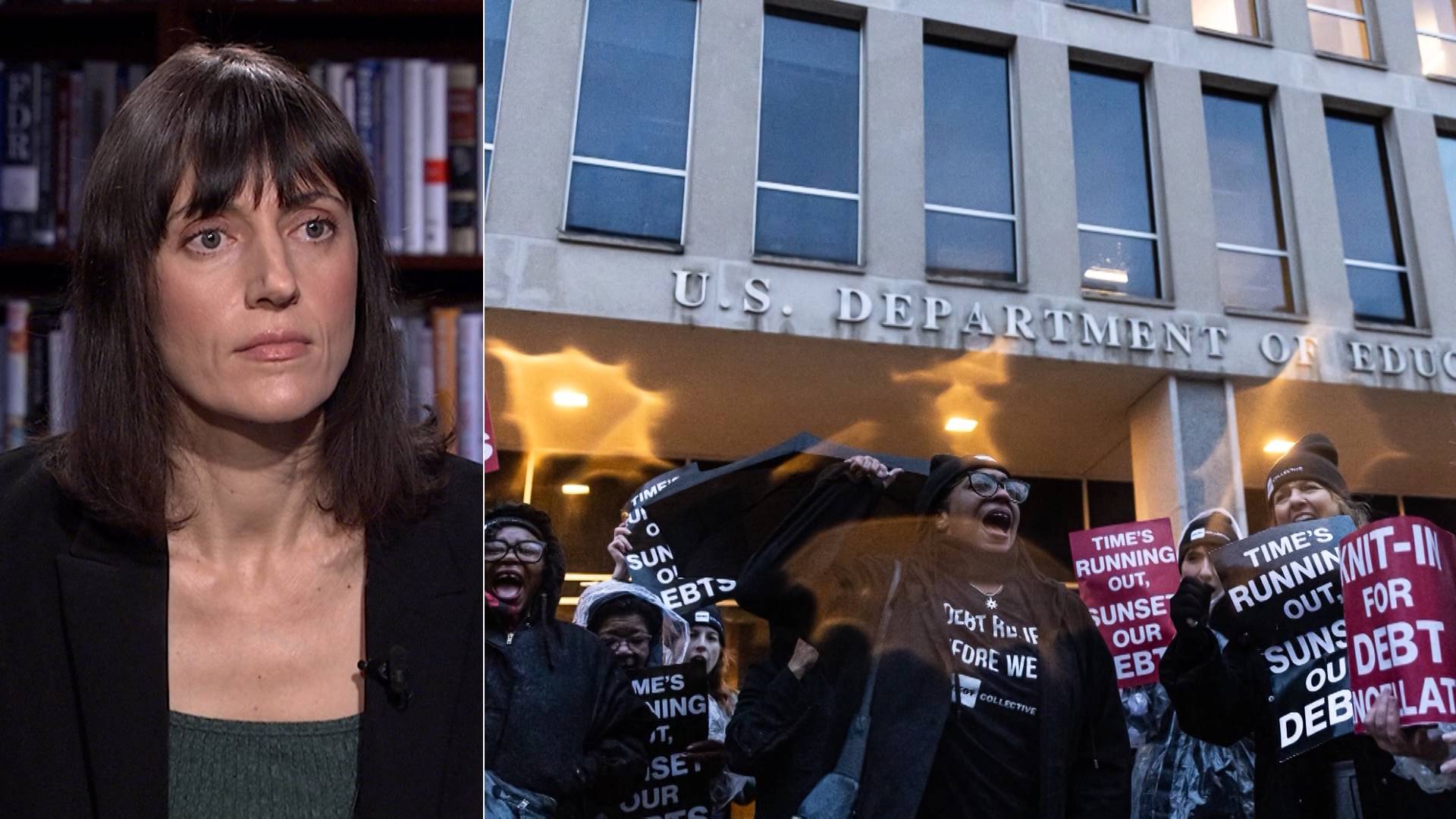This is a rush transcript. Copy may not be in its final form.
AMY GOODMAN: This is Democracy Now!, democracynow.org, “War, Peace and the Presidency.” I’m Amy Goodman.
As President Biden enters his final month in office, he’s facing calls to grant more debt relief to millions of student borrowers. According to the White House, the Biden administration has approved $175 billion in student debt relief for nearly 5 million borrowers over the past four years. But advocacy groups, including the Debt Collective, have urged Biden to support broader debt relief before Donald Trump returns to the White House. The Debt Collective recently launched a campaign to pressure the Biden White House to cancel student debt for older student debtors. This is an excerpt from a video produced by the Debt Collective.
NARRATOR: President Biden still has full authority to free elders of these debts before Trump takes power.
BECKI WELLS: The only thing that’s standing between us and student loan relief is political will.
RENITA WALKER: But I think the broken system is what put us here. Advocating for myself and the other people in the Debt Collective is the reason I am here today.
UNIDENTIFIED: We give billionaires a slap on the wrist and bail them out. It’s time to bail out struggling working people.
NARRATOR: If Biden doesn’t use his powers, millions will die in debt.
SARAH BUNDY: There’s going to be an army of seniors who are having their Social Security garnished for their student loans. And that social safety net that’s put in place for so long — people are going to be in poverty.
BECKI WELLS: There is a provision, federal claims collection provision 902.2, that will allow the president to eliminate the debt, even if there are legal challenges. And so, we’re here to let the senators know about it.
NARRATOR: Federal claims provision 902.2 allows government agencies to cancel debt based on the debtor’s age. Essentially, the federal government knows these debts will never be paid and will simply be discharged when people pass away.
TRIANA ARNOLD JAMES: It is the right thing to do, especially for an older debtor. It’s the right thing to do.
AMY GOODMAN: A new video from the Debt Collective. We’re joined now by Astra Taylor, co-founder of the collective. Her new piece for The Nation is headlined “It’s Still Not Too Late for Biden to Deliver Debt Relief.” She’s also a filmmaker and author of several books.
Astra, we only have a few minutes. This is such a critical issue right now. Explain what you’re saying Biden has it in his power to do. You’re going to the White House in a few days once again to talk to the folks there.
ASTRA TAYLOR: Yes, this is a Titanic moment for the Biden administration. They have crashed into the authoritarian iceberg of the Trump administration, and it is their duty to fill as many lifeboats as possible, to do what they can to protect us on multiple fronts. Student debt relief is the one I know well. There are many legal mechanisms, long-established legal authorities, that the Biden administration can use to issue group discharges for people who have ironclad claims to debt relief. This is work the Biden administration should have done on day one, make no mistake, but as we have a limited number of days, they need to get to work and do this.
You know, we’re pushing against stereotypes. There’s the stereotype of the student debtor as privileged — right? — as upwardly mobile. The fact is that the vast majority of student debtors, especially the people in the most distress, went to for-profit colleges where they are systematically defrauded. I hear a very deep resonance with the previous guest. And when you turn over public goods to the profit motive, terrible things happen. So, these are schools that target vulnerable borrowers, first-generation students, single parents, veterans, disabled folks, and bury them in debt for worthless degrees. These people have strong claims, and the Biden administration has a backlog of over 400,000 applications for debt relief for these folks. And Senator Edward Markey and Dick Durbin and 70 other representatives have signed a letter saying, “Cancel the debt for these folks.”
And then there also are older debtors, who, contrary to stereotypes, are the fastest-growing demographic of student debtors. Every quarter, there are more and more older folks in debt. People are aging into their student loans, not aging out. Nine million older debtors over the age of 50 owe $400 billion. They’re going to get relief when they die. Not to be morbid, but it’s coming. Why not let them retire in dignity by canceling this debt? Because we know once Trump is in office, their hopes are dashed.
AMY GOODMAN: So, explain that, when Trump is in office, Project 2025 and the far-right push against student debt relief. Talk about what their plan is. And President Biden is saying he tried, but courts stopped him.
ASTRA TAYLOR: You know, unfortunately, the Democrats have set the Republicans up for success. We’ve been organizing since the Occupy Wall Street era, pushing first for for-profit borrowers and then broadening our demands out for student debtors more broadly, with the horizon of total student loan abolition and free college for all. We think college needs to be free as in price and free as in freedom. It’s a public good. Unfortunately, the Democrats have only sort of tweaked at the margins, are very insistent on making individuals file for relief one by one, instead of tackling this issue.
And we saw this — we’ve seen this movie before. We were organizing under the Obama administration, and what we saw was that student debtors were thrown to the wolves, and that the first time around, Donald Trump made very clear that it was his priority to stop student debt relief and to also embolden the for-profit college industry. And we’re seeing right now, in advance of January 20th, when he takes power — we’re seeing the stocks of those for-profit education companies going up. So, Project 2025 is very clear that they want to end student debt cancellation, that they want to privatize public education. In fact, we won’t be talking about abolishing student loans; we’ll be talking about abolishing the Department of Education.
And so, it’s extremely serious. You know, people need to keep organizing. That’s what the Debt Collective is going to do as the — you know, in the years ahead. But right now it is incumbent on the Biden administration that they fill those lifeboats, that they grant clemency to debtors, who have done nothing wrong and whose lives are being destroyed.
AMY GOODMAN: The Biden administration has granted some $175 billion in student debt relief to about 5 million borrowers. But you say in The Nation that even these numbers are deceiving.
ASTRA TAYLOR: Yeah, these numbers are deceiving. Well, first off, much of this debt relief was issued through programs that already existed, that they fixed to some degree — for example, public service loan forgiveness or income-driven repayment programs — but these were preexisting mechanisms that the government should make work. I mean, public service loan forgiveness is actually a George W. Bush-era program. So, while we cheer every instance of debt cancellation for nurses, for teachers, for other public servants, it’s the bare minimum.
And unfortunately, sometimes the reality doesn’t match the press release. So, there was a big to-do about debt cancellation for students from Corinthian Colleges, which is something we’ve been working on for a decade. The fact is that over 100,000 people have not actually gotten that promised relief.
So, there is a real problem with implementation, with matching deeds with words with the Democrats. And I think it’s actually a parable about the problems with how the Democrats govern, more broadly. You know, this speaks to a bigger problem than just student debt relief, which is having the courage of your convictions, actually governing to the full ability of your authorities. Again, there’s a Swiss Army knife of legal tools that the Biden administration can use to cancel debt relief. They should be using them all, as boldly as they can.
AMY GOODMAN: So, what are they telling you at the White House? You’ve been there several times.
ASTRA TAYLOR: Well, we’ve been told that for-profit debtors, in particular, have strong, irrefutable claims to debt relief. So, that makes us wonder, “Well, then, where is it?” Again, a backlog of 400,000 applications and many more people who are defrauded by these schools.
We have seen the headlines that said that in the administration’s final sprint, that student debt relief is a priority. We’re going to try to keep pushing them to make that happen. People should call their representatives, call the White House, say that this is important. And it’s important, in part, because it’s one of the things that can’t be undone. Once that debt cancellation is delivered to the people who deserve it, it’s going to be there. It’s going to change their lives.
AMY GOODMAN: We’re in a very unusual climate right now, where you have the alleged assassin of the head of UnitedHealth, the UnitedHealth CEO — you have him being hailed a hero by some, because it has opened up this enormous backlash, outcry against the health industry and insurance. Do you see student debt in the same way?
ASTRA TAYLOR: Absolutely. The Debt Collective is a union of debtors, and we organize across debt types. We also organize with medical debtors who are pushing for public universal healthcare. We are also organizing renters who are pushing for a model of housing provision that’s not based on profit. So we see these debt types as all connected. And many student debtors have medical debt. In fact, 100 million people in this country have medical debt. And that’s part of why people are so frustrated, right? That’s part of why people are using this moment to express their frustration with systems that profit from people’s pain, their sickness, their poverty. And so, this is something that we’ve been organizing around, doing different campaigns for medical debt relief. But this is urgent.
AMY GOODMAN: We only have a minute to go. In this last month that President Biden is in office, you’re saying he should use this moment to support a number of issues, including abortion funds around the country. Explain.
ASTRA TAYLOR: Yes, the Debt Collective this week just announced that we’re erasing $50,000 of abortion debt, which is a horrible phrase that people probably never heard before, but it’s becoming a reality post-Dobbs, which is the decision that overturned Roe v. Wade. So, without a constitutionally enshrined right to abortion, what’s happening? There are fewer opportunities for care, because providers are being shut down, and so people are having to travel further, which can cost — it can cost $1,500, $1,600, $2,000 to travel. So, abortion funds are in crisis. And what we’re hearing anecdotally is that providers are saying, “Put your abortion on a payday loan. Put it on a credit card. Borrow money from your family.” So, this is something that this is a new dimension to the crisis of reproductive health justice. We believe abortion debt is medical debt. It should all be abolished. Abortion is healthcare. Healthcare should be free. And the Biden administration should do what it can to pardon abortion providers in advance of the Trump administration.
AMY GOODMAN: Well, I want to thank you for being with us, Astra Taylor, co-founder and organizer of the Debt Collective. We’ll link to your piece in The Nation, “It’s Still Not Too Late for Biden to Deliver Debt Relief.”
Coming up, The Bibi Files. As Israeli Prime Minister Benjamin Netanyahu is on trial for corruption, we’ll look at this new film with the film’s Oscar-winning producer, Alex Gibney. Stay with us.
[break]
AMY GOODMAN: “Cadence” by Béla Fleck, Zakir Hussain and Edgar Meyer. Hussain passed away Sunday at the age of 73.











Post comments (0)